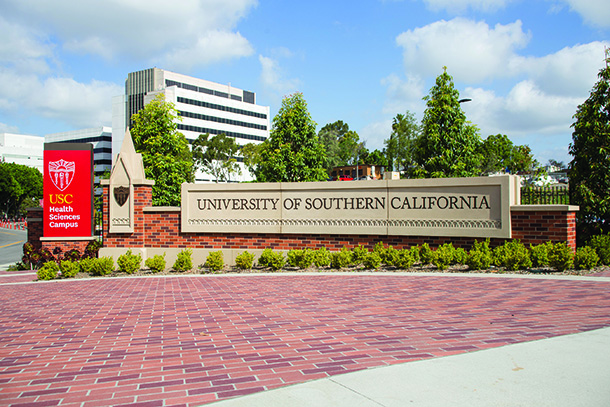Katherine Greenwood and Thomas Kosakowski were announced Jan. 29 as the university ombuds. Here is a Q&A with them on the new USC Office of the Ombuds and their roles.
Q. What is an ombuds?
A: An ombuds, or ombudsperson, is an individual who serves as a confidential, impartial, informal and independent problem-solving resource. Fundamentally, ombuds are dispute resolution professionals who assist individuals and groups in navigating through conflict. We strive to create a safe place for people who come to the office to discuss and examine concerns. We do this by listening to issues and concerns that are raised, clarifying goals and objectives, brainstorming options, weighing the pros and cons of particular courses of action, making appropriate inquiries and providing referrals to other resources. We serve as conflict and communication coaches to help faculty, students and staff increase their comfort and skill in addressing conflict as it arises, and we also offer mediation services and other alternative dispute resolution resources. Ultimately, we strive to promote a culture of “conflict competency” by sharing conflict management models, tools, and strategies across the institution.
Q. What are examples of the issues one might bring to the Office of the Ombuds?
A: The ombuds office is equipped to address a wide variety of issues and concerns, which can fall into several broad topic areas, including organizational climate, change management, interpersonal issues, ethical concerns, issues of perceived unfairness or incivility, behavioral or stylistic differences in the workplace or classroom, or inquiries related to university procedures and policy.
As an example, faculty might bring issues relating to departmental governance, interpersonal issues with colleagues or concerns about students. Alternatively, staff might raise issues relating to workplace climate or the managerial style of their supervisors or perceptions of unfairness in workload distributions. Managers or administrators might seek the ombuds in exploring various communication strategies to ease strained relationships with employees in their reporting line. Undergraduate students might raise academic concerns relating to grading or university departments, roommate concerns and issues of fairness arising from group projects. They also may pose questions regarding difficult conversations that they want to hold with their parents, peers and professors. Graduate students might bring concerns relating to the power dynamics with their advisors, peers or projects or authorship issues. In addition, at the Health Science Campus, medical personnel may raise concerns about the allocation of shift assignments, interpersonal exchanges in high stress situations or ethical issues.
Q. How does someone know when to bring a concern to an ombuds versus reporting it through another campus office?
A: The ombuds office does not replace other campus resources but instead is an informal place where members of the campus community might start exploring a concern, policy or issue, and that is why ombuds are better utilized as an “office of first resort” as opposed to an “office of last resort.” For people considering whether to report an issue to a formal campus resource, they may want to talk to an ombuds first to weigh various options. Sharing information with the ombuds office does not “let the university know” about an issue or concern, but if individuals wish to put the university on notice, the ombuds office will direct them to the appropriate campus reporting unit.
Q. What resolution, if any, could one expect from an ombuds?
A: Ombuds do not directly resolve issues. Instead, we help to empower community members to analyze, strategize and choose what to do. Since ombuds act outside of formal channels, we do not have authority to direct any specific outcomes. Furthermore, we are not factfinders; nor do we adjudicate issues, make determinations, conduct investigations, accept notice on behalf of the university, give legal advice or provide psychological counseling.
Q. Why is USC creating these positions?
A: In the wake of a number of institutional issues, USC recognized the critical importance in establishing an ombuds office as a neutral and independent safe place for university constituents to confidentially share their concerns, issues, and challenges. In addition to assisting members of our community, another value that an ombuds office will provide to USC is that of upward feedback. As we identify patterns, trends, or systemic concerns, we share this upward feedback with the university through anonymized and depersonalized data and information. Accordingly, we can serve as a potential early warning system that alerts the university to possible concerns while also maintaining strict confidentiality.
Q. Who do the ombuds report to?
A: The Office of the Ombuds is independent and confidential by design and structure, and therefore occupies a unique space in the university’s organizational chart. At USC, the ombuds ultimately report, by a dotted line, to the Provost’s Office. For administrative, budgetary, and logistical matters, the ombuds report to Vice Provost Varun Soni, who oversees the Office of Campus Wellness and Crisis Intervention. The ombuds are expected to have regular contact with administrators at all levels within the university.
Q. How does someone access the Office of the Ombuds?
A: The services provided by the Office of the Ombuds are free, voluntary and confidential. The best way to access the ombuds is to schedule an appointment via telephone or email. The Health Sciences Campus ombuds office contact information is (323) 442-0341 or hscombuds@usc.edu, and the University Park Campus ombuds contact information is (213) 821-9556 or upcombuds@usc.edu.


